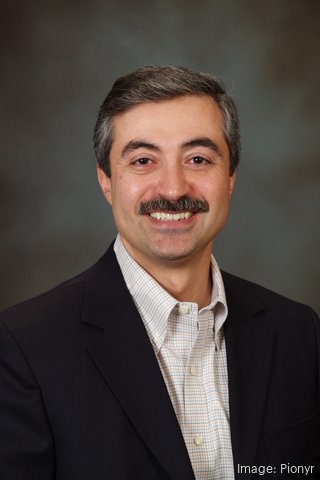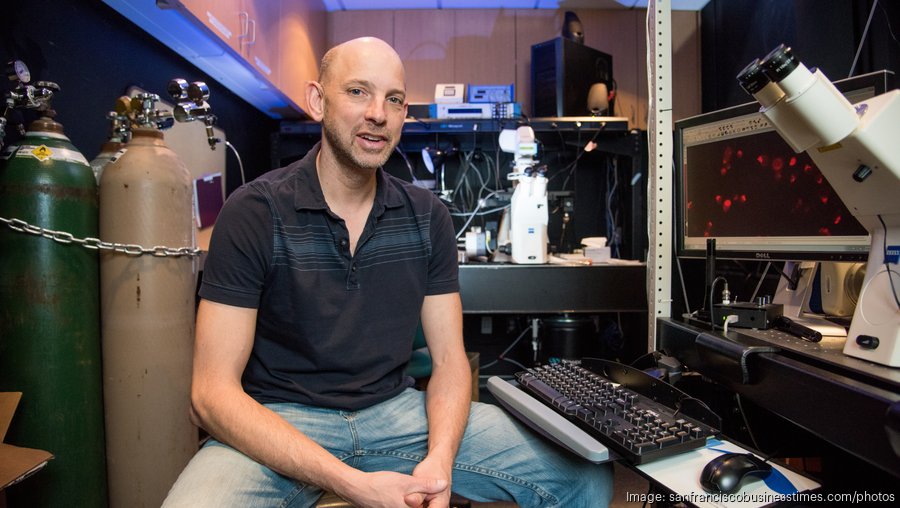Gilead Sciences Inc. secured two cancer drugs heading into clinical trials as part of a potential $1.75 billion deal for a South San Francisco company only a year removed from a biotech incubator.
The play for Pionyr Immunotherapeutics Inc. — $275 million upfront for a 49.9% stake with an option to buy the remainder of the company after Phase I clinical trials — is Gilead's third deal with a Bay Area cancer-related company in less than three months. More importantly, it gives Foster City-based Gilead (NASDAQ: GILD) another approach to use in the fast-moving war against cancer.
Pionyr, founded by immunotherapy pioneer and University of California, San Francisco, pathology professor Dr. Matthew "Max" Krummel and University of Toronto professor and former Genentech Inc. scientist Sachdev Sidhu, has focused on modulating the immune system so the body's own defenses can attack cancer. It calls its approach "myeloid tuning," resetting the microenvironment within a tumor so that myeloid cells, which normally are recruited to sites of tissue damage and infection but are coopted by tumors, are selectively depleted and fresh cells called up.
Think about cancer immunotherapy in three ways, said Pionyr President and CEO Steven James: One approach steps on the accelerator to activate infection-fighting T cells, while another, centering on "checkpoint inhibitors," removes the brakes that tumors deceptively convince the immune system to apply, and Pionyr is turbocharging the immune system's anti-tumor response.
"In the Gilead portfolio, if they have access to checkpoints, (myeloid tuning) could be nice to add on for certain solid tumors," James said, adding that Pionyr’s preclinical work demonstrates its drugs also could defeat tumors on their own.

Gilead most certainly does have checkpoint inhibitors after its April acquisition of Menlo Park's Forty Seven Inc. for $4.9 billion. And late last month, it disclosed a potential $2 billion, 10-year collaboration with Arcus Biosciences Inc. (NYSE: RCUS), a Hayward company with four cancer-fighting drugs in clinical trials.
Gilead bought Southern California cancer cell therapy company Kite Pharma in 2017 for $11.9 billion and this past January added an investment in Berkeley autoimmune disease cell engineering startup Kyverna Therapeutics.
All of Gilead’s local deals have come under Chairman and CEO Daniel O’Day, who took over in March 2019.
“They’re charging into cancer and immuno-oncology and showing that they are being smart and following the science,” James said. “If it happens to be in the Bay Area, that’s probably just following the great science, and the Bay Area has some of the best, if not the best, science.
“They’re finding stuff in their own backyard.”
For Pionyr, the deal comes at a good time for a 40-employee, five-year-old company that had raised $78 million in two funding rounds from the likes of New Enterprise Associates, OrbiMed, SV Health Investors, Sofinnova Ventures, Vida Ventures, Osage University Partners, Mission Bay Ventures and Trinitas Ventures.
Pionyr, which grew out of the MBC BioLabs incubator in San Francisco and took a floor and a half in the Genesis tower in South San Francisco, looked at licensing or partnering one of the programs it plans to take into clinical trials later this year or raising a Series C round and then going public. It started discussions with Gilead late last year.
“We had multiple partnering discussions,” said James, who led the 2014 sale of San Mateo migraine drug developer Labrys Biologics to Teva Pharmaceuticals for up to $825 million and two years earlier sold South San Francisco’s KAI Pharmaceuticals, which developed a drug for chronic kidney disease patients, to Amgen Inc. (NASDAQ: AMGN) for $315 million.
As the Gilead deal was progressing, though, the Covid-19 pandemic struck, James said, “and we started thinking of the risk of going it alone and other types of deal structures.”
In the Gilead deal, which is expected to be completed in the third quarter, Pionyr will launch and run the Phase I trials of its two drugs — PY-314 and PY-159 — and Gilead then can exercise an exclusive option for a $315 million fee.
Gilead also could pay up to $1.15 billion in potential future milestone payments.
Bay Area employees
| Rank | Prior Rank | Business name/Prior rank |
|---|---|---|
1 | 1 | Genentech |
2 | 2 | Gilead Sciences Inc. |
3 | 3 | BioMarin Pharmaceutical Inc. |





